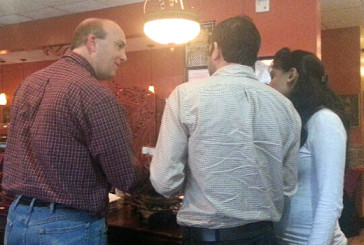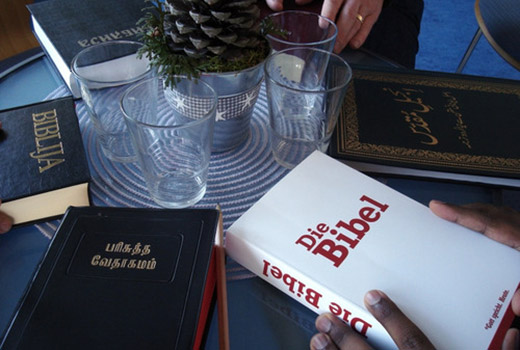An event designed to identify and engage unreached people groups in South Carolina was held March 26-28 in Columbia. Jeff Dunson, of the International Mission Board’s American peoples affinity group, coached 53 participants to understand and identify unreached people groups living in the United States and then led teams to encounter various people groups living around the Columbia area.
The purpose of the experience was to educate believers on how to identify and intentionally engage unreached people groups, with the longer-term goal of starting new churches to reach those people groups. It represents a new way to view local missions.
“When these people groups come to live in the United States, we have a God-given responsibility to proclaim the gospel to them right here at home in a way that they can understand and be able to respond to,” Dunson said. “It is imperative that we recognize the movement of God’s Spirit as He brings these unreached people groups to our towns and cities. Acts 17:26-27 tells us that God’s purpose in the rise, fall and movement of nations is so that they can seek after God and perhaps find Him.”
In his ongoing work with IMB to map indigenous tribes from Mexico now living in the United States, Dunson utilizes the PeopleGroups.info Initiative, which is a joint partnership of the North American Mission Board and IMB to identify people groups in order to start new churches among unreached people groups. Its website serves as a collection port for reported data on who is living in the United States, where they live, basic information about the people group, and if they are currently being reached in any way with the gospel.
“The PeopleGroups.info Initiative is working to map the people groups in the 100 largest American metropolitan statistical areas, where 86 percent of the foreign-born population in the United States may be found,” Dunson said. The work is important to South Carolina because Columbia, Greenville and Charleston are in the top 100 metropolitan statistical areas, in addition to the Charlotte/Rock Hill and Augusta/North Augusta areas that reach across bordering state lines.
The initiative encourages the process of interacting with people groups, and the weekend workshop provided the opportunity for participants to do that in the greater Columbia area. While participants did not immediately report data collected from the people group encounters back to PeopleGroups.info, they were exposed to the process.
Bob Burton, a NAMB national mobilizer, participated in the workshop and said his desire is to see more South Carolina Baptists “living loud,” adding that the ministries NAMB is involved in revolve around people groups. “As people do local mission engagement, they will do things globally, too,” Burton said. “My prayer is that as a result of this workshop, people will apply what they’ve learned and intentionally engage these people groups to continue to look until every people group living in the United States is exposed.”
The excursion trips took place on day two of the workshop. Participants divided into groups and were given itineraries that were centered on South Asian, South American, Arab Muslim, and Asian people groups and included suggested restaurants, markets and places of worship to visit. The groups took note of clues about the people groups they encountered, including the individual’s “trade language” and “heart language” that they identified with; the country, region and town they were from; and how many from their people group lived in the area.
Dunson shared that in a matter of hours his own team encountered seven different ethnic groups in Columbia as they visited a market, restaurant, apartment complex, and Hindu temple.
Jim Goodroe, Spartanburg County Baptist Network director of missions, described meeting a Nepali waitress in an Indian restaurant that served members of his excursion team. “When I asked if we could pray for her, she did not seem to understand the concept of prayer, but she stayed with us while we prayed,” he said.
During a debriefing session that followed the excursions, some common impressions about the experience included the ease of conversations, how willing most individuals from different people groups were to engage in answering the non-threatening questions, and, as a result, many participants shared that they plan to be more intentional about starting conversations like these in the future.

Jeff Rafferty, missions pastor from First Baptist Church of Pickens, speaks with a couple he met at an Indian restaurant during a workshop in Columbia that focused on identifying unreached people groups. Columbia is one of three metropolitan statistical areas in South Carolina that the IMB identifies as having high concentrations of people groups.
Jeff Rafferty, discipleship and missions pastor at First Baptist Church of Pickens, said he was amazed at the opportunities to do foreign missions right here in South Carolina. “This experience has opened up my mind to other mission opportunities in Pickens,” he said. “I see foreign people working in restaurants and gas stations all the time. Interacting with them is as simple as getting a Coke at the gas station and then starting a conversation.”
Dot Whitmire, a member of First Baptist Church of Fort Mill and a literacy missions consultant with the South Carolina Baptist Convention, said individuals from these people groups regularly come to her church for the English-as-a-second-language classes that she teaches. “What I’ve learned today is that I can go to them,” she said.
In all, the excursion teams identified 28 different people groups that they encountered around Columbia.
As the work to identify people groups continues across the state, Dunson encourages further ministry outreach to the people groups. Individuals and churches can meet basic needs and intentionally work toward starting reproducible churches for these people groups. Dunson also encourages participating in the PeopleGroups.info data-gathering process by entering related information as people groups are discovered.
“Why can’t your church, your Sunday school class do this as well? We need to discover these people groups, to open our eyes, and then ask what we can do next,” Dunson said.
“Great Commission living calls us to reach people of all nations, whether they live near us or far away. Our next step is to build teams in various parts of the state who will look for and engage people groups where they live,” said Tim Rice, director of missions mobilization with the state convention.
“If we don’t do it, who will?” asked Burton.
